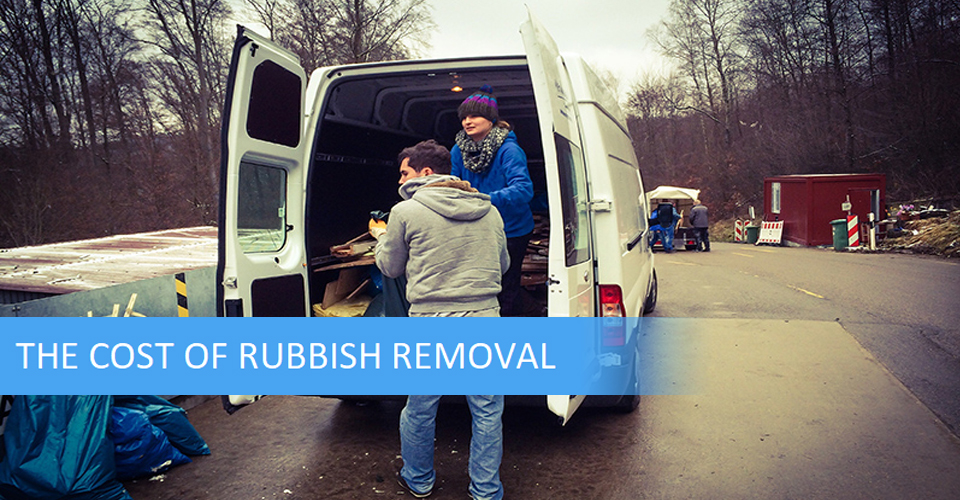How Much Does Rubbish Removal Cost?

Not all rubbish is created equal. Because of that, the cost of rubbish removal can vary widely, depending on what you want disposed of and how many resources are needed to dispose of it.
The following is some general information that can help you formulate a rough estimate of how much it will cost for you to get rid of your rubbish.
Types of rubbish removal approaches
Each year, the UK generates over 200 million tonnes of waste. As you can imagine, that opens the door for several types of rubbish removal approaches, including charging by item, volume, and classification. Most companies incorporate the following cost structures into their pricing, and charging by the:
- Cubic yard (aggregated over the life of the removal contract)
- Van load
- Weight
- Specialty classification (refrigerator, television, mattress, etc.)
- Item
Each type of rubbish has a sliding scale directly proportional to the type and volume of the rubbish you want to be removed. Understanding where your rubbish fits into those four areas is key to ensuring you get an accurate estimate of the costs of removing it.
 5 Factors that affect your rubbish removal cost
5 Factors that affect your rubbish removal cost
The goal of any rubbish removal company is to provide the customer with a removal service at a fair price.
With that in mind, several assumptions can be made to get a general estimate of the cost of removing your rubbish. Remember that these are estimates, and you will need to call your rubbish removal company to get a fair quote on a removal price.
1. By the Cubic Yard
Removing rubbish is a charge formula based on volume. Under this structure, the more rubbish you need removed, the higher the cost.
There is usually a minimum yardage amount a company will charge, but after that, you pay for what you have to remove.
Rubbish removal by the cubic yard is the best way to go when there are a lot of items that need removal, but the items will not easily fit into a standard van or rubbish receptacle. A receptacle gets dropped off with the customer, and they fill it.
When full, the dumpster is hauled off and replaced. Cleaning out someone’s house or construction sites employ this method because it allows them to control costs by controlling what gets thrown away.
2. By the Van
A “by the van” charging structure is another form of charging by volume, but it has more limitations.
For example, a full van load of rubbish will weigh up to 1200kg and cost £270 to £290. A half load comes in between 500 and 700kg and costs about half that. A quarter load typically will range between 200kg through 300kg and cost £90 to £100.
 You pay based on how much of the van your rubbish fills. Most companies will have a minimum sized load requirement of around 100kg (£50 to £70) before they show up because their team must turn over a certain volume of trash to cover fuel and labor costs.
You pay based on how much of the van your rubbish fills. Most companies will have a minimum sized load requirement of around 100kg (£50 to £70) before they show up because their team must turn over a certain volume of trash to cover fuel and labor costs.
The maximum limit is the capacity of the van, reasonably packed. The term “reasonably packed” means they will fill a vehicle’s load bay but will not jam rubbish into it.
If you are interested in this service. Check these man and van services:
3. By Weight
Depending on the type of rubbish, some companies will charge a load by weight. A weight-based charging system covers loads that tend to be heavy. Rubbish is put into pre-weight receptacles and weighed when full. The difference in weight makes up the charge.
So if a dumpster weight 1,000 pounds and 500 pounds of rubbish were added to it, the charge would be for 500 pounds. Another example is getting rid of metal. A van gets loaded with metal, where offloading it and weighing each item individually would be cost-intensive and inefficient. The weight above the van’s weight makes up the charge.
Another common form of rubbish removal by weight is disposing of materials used in construction. Refuse wood, metal, flooring, and roofing materials tend to be heavy and can quickly eat up space in a dumpster. At a construction site, it is not uncommon to have a lot of materials taken out of a building, plus the waste from new materials.
The reasons for this type of charge are overall weight and transport cost (fuel costs and lower MPG because of the weight,) loading and unloading.
4. Specialty Rubbish
Some rubbish falls into the category of “special removal.” The rubbish must require special handling, transportation, or disposal to earn this designation. Examples of specialty rubbish include:
- Hazardous Materials (HAZMAT)
- Medical waste
- Excessively large, voluminous, or heavy objects
Each of these requires training and experience beyond basic rubbish removal training.
HAZMAT removal, for example, requires special training, protective clothing, and specialized processes to prevent the rubbish from contaminating anyone or anything.
Examples of HAZMAT rubbish can include, but are not limited to:
- Asbestos removal and disposal
- Removal and disposal of chemicals
- Mold removal and disposal
- Any other substance that could injure or make a person ill
 Medical waste is a form of HAZMAT but has its own transport, handling, and disposal procedures. Needles, for example, do not require specialized clothing but do require extreme care and are stored in specialized containers. Any bodily fluids or parts have specific legal processes for removal, transport, and disposal.
Medical waste is a form of HAZMAT but has its own transport, handling, and disposal procedures. Needles, for example, do not require specialized clothing but do require extreme care and are stored in specialized containers. Any bodily fluids or parts have specific legal processes for removal, transport, and disposal.
Excessively large, voluminous, or heavy objects include anything that requires specialized equipment to remove. Ripping off the roof of a building would fall into this category, as would taking out a restaurant’s cooler or transporting a vehicle to a junkyard.
Some forms of specialty rubbish will require specific government transport and disposal processes. When this is the case, you will likely have to hire a company specializing in that type of waste. A standard rubbish removal company will inform you that they cannot legally handle the items you want to be disposed.
5. Item
Certain items require special handling but do not fit into the above categories. These include televisions, refrigerators, washers, mattresses, dryers, etc. These types of items usually have a specific cost associated with the item. For instance, a refrigerator will cost £75 while a mattress will cost about £15.
Final Thoughts
The amount you pay for rubbish removal will depend on the type of rubbish you need to be removed. Using a veteran removal company will ensure you get the most reasonable and predictable pricing available. Call Transport Executive at (44) 2033 184 720 for a free quote!
If you are looking to do house removal. Check these services:


 5 Factors that affect your rubbish removal cost
5 Factors that affect your rubbish removal cost